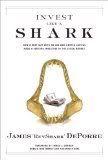 Recently, I have re-examining my investment style, and reading many investment books as part of the process. The book that has most influenced my thinking is Invest Like a Shark by James DePorre. DePorre believes most small investors are making a mistake when they use a long-term buy-and-hold strategy and buy mainly large-cap blue chip stocks. Investment firms employ large numbers stock analysts, and it is extremely difficult to compete on the basis of fundamental analysis, especially with the large- and mid-cap stocks. By running their personal portfolios as miniature mutual funds, small investors ignore the advantages of their small size. DePorre advocates active trading guided with a minimum amount of fundamental analysis and extensive use of charting to gauge market psychology, and focusing on small-cap stocks which are mostly overlooked by large market participants. Above all, DePorre eschews the buy-and-hold philosophy, insisting that small investors should make use of their ability to easily move into and out of positions to book gains and limit losses by aggressive selling.
Recently, I have re-examining my investment style, and reading many investment books as part of the process. The book that has most influenced my thinking is Invest Like a Shark by James DePorre. DePorre believes most small investors are making a mistake when they use a long-term buy-and-hold strategy and buy mainly large-cap blue chip stocks. Investment firms employ large numbers stock analysts, and it is extremely difficult to compete on the basis of fundamental analysis, especially with the large- and mid-cap stocks. By running their personal portfolios as miniature mutual funds, small investors ignore the advantages of their small size. DePorre advocates active trading guided with a minimum amount of fundamental analysis and extensive use of charting to gauge market psychology, and focusing on small-cap stocks which are mostly overlooked by large market participants. Above all, DePorre eschews the buy-and-hold philosophy, insisting that small investors should make use of their ability to easily move into and out of positions to book gains and limit losses by aggressive selling.
Is it feasible to beat market professionals at fundamental analysis? A popular argument is that many mutual fund managers are closet-indexers and have a follow-the-herd mentality, and do not dare to take contrarian positions. This argument is increasingly untrue today. The modern hedge fund manager is typically a major shareholder in this own fund, and stands to gain much more from performance bonuses than from asset fees, and hence is heavily incentivized to take contrarian positions. Large funds have the resources to employ analysts to collect and analyze public information, as well as generate non-public information about business and industry conditions by calling up suppliers and clients and doing their own in-house research. Furthermore, there are theoretical limits to fundamental analysis, and technological breakthroughs and other Black Swan events are essentially unpredictable. Faced with these obstacles, I think that it is hubris to assume that I can outperform the professionals in the large- and mid-cap stocks. My greatest chance is probably in the small-cap stocks, especially those that have analyst coverage.
Does active trading hurt or help? The traditional arguments against over-trading is the drag of trading commissions and tax inefficiency. In practice however, I find that these factors are overwhelmingly outweighed by the investment gains involved. In a retrospective analysis of my stock holdings, I found that in most of my losing positions, I was at one time up more than 20%, and if I had aggressively booked my profits, or cut my losses when I was down 10% or more, I would be a far better shape today investment-wise. A more serious drawback is that over-trading may cause me to liquidate a potential ten- or twenty-bagger long before it reaches its full potential (in his book, DePorre hints that this is the major drawback of his strategy). However, in practice, such situations are extremely rate, and even professional fund managers manage to find only a couple of these multi-baggers in their entire career. I am increasingly convinced that my problem is not over-trading, but under-trading.
I have decided to start experimenting with a more active trading approach. I am not going to completely abandon my fundamental value-investing roots. Fundamental analysis and value investing appeal strongly to my rational side. However, I have acquired a newfound respect for the ability of technical analysis to reveal market psychology. I will attempt to overlay technical analysis on my fundamental analysis, concentrating on small-cap stocks, which have a higher chance of being mispriced because they are both under-researched and their trading is dominated by small investors who are more prone to psychological snafus (and I might be one of those investors!). More importantly, I will adopt a more rigorous money management approach to mitigate the greater risk involved in holding small-cap stocks. An attractive aspect of the short-term investing approach is the speed of feedback. I expect to give an update to this approach in a few months.

{ 6 comments… read them below or add one }
As I was going through what books to read, this was always on the shelves at the bookstore but just reading reviews and a few pages it turned me off. It was probably the technical analysis part that did it for me.
As to the question can small investors beat market professionals? Im a firm believer that the answer is yes.
While there are many managers out there that invest in a contrarian manner, I believe the vast majority of fund managers are sheep that are insecure about their jobs every quarter when earnings and large price fluctuations occur.
I guess the reason why I don’t like books such as this one is that it emphasizes ideas of Wall Street on the small investor. Whether we make 20% or lose 10%, the house always wins.
Have you read Active Value Investing? It may also be closer to what you are looking for.
Interesting viewpoints. I am actually doing something similar. I am using stocks that I have a good understanding of (in the financial sector) and have been trading aggressively. Although trading commissions eat your gains, I have found that picking up a few percentage points here and there have more than paid for the extra commissions.
Have you read any of Alexander Elder’s books? – really good for money management and trader psychology. Not so much on investing, but you seem well versed in that, you can definitely incorporate some of his ideas into your investing strategy.
http://www.amazon.com/s/ref=nb_sb_noss?url=search-alias%3Dstripbooks&field-keywords=alexander+elder
To Jen Francis. Thanks for the tip. I have not read Elder’s books, but I look forward to reading them.
I every time used to read piece of writing in news
papers but now as I am a user of web thus from now I am using net for articles or reviews,
thanks to web.
Good day! Do you know if they maqke anyy plgins to protect against hackers?
I’m kinda paranoid about losing everything I’ve worked hard on. Any suggestions?